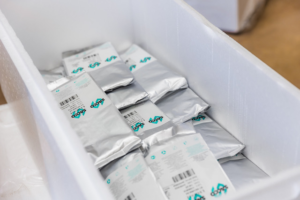Amasi; It’s a culture thing…
What started out as a preservation technique many years ago, by naturally fermenting excess milk in calabashes or clay pots, has turned into a popular traditional product that is widely consumed in South Africa, as well as other African countries. Locally, amasi is the single biggest fresh fermented dairy product produced, with the majority of consumers being in the lower LSM group (LSM 1-5). Under the current economic conditions amasi remains the most affordable source of protein compared to meat and other dairy commodities. This healthy and nutritious beverage is mostly consumed as is or enjoyed with maize meal porridge (pap). However, it is also gaining a lot of popularity as a baking ingredient used for making scones, rusks, tea cakes and soft rolls.
 Amasi has been described as a liquid-like creamy white beverage with a smooth to chunky texture and a definite sour taste accompanied by a fizzy sensation on the pallet. The distinct taste, aroma, consistency, and texture is attributed to a unique consortium of lactic acid bacteria (LAB). In traditional home-made amasi these organisms are endogenous to the unpasteurised milk and spontaneously ferment the milk over a period of 2-3 days at 25°C. However, since the commercialisation of amasi, producers use pasteurised milk inoculated with specific mesophilic-heterofermentative LAB starter cultures. The use of starter cultures ensures a faster and controlled fermentation as well as a uniform and consistent final product within 16-24 h at 25°C.
Amasi has been described as a liquid-like creamy white beverage with a smooth to chunky texture and a definite sour taste accompanied by a fizzy sensation on the pallet. The distinct taste, aroma, consistency, and texture is attributed to a unique consortium of lactic acid bacteria (LAB). In traditional home-made amasi these organisms are endogenous to the unpasteurised milk and spontaneously ferment the milk over a period of 2-3 days at 25°C. However, since the commercialisation of amasi, producers use pasteurised milk inoculated with specific mesophilic-heterofermentative LAB starter cultures. The use of starter cultures ensures a faster and controlled fermentation as well as a uniform and consistent final product within 16-24 h at 25°C.
Unlike yoghurt, amasi is an unfamiliar segment internationally and it is therefore difficult to replicate or capture the essence of amasi since the desired profile it is not well understood. Synercore, one of South Africa’s leading food ingredient suppliers, in collaboration with Italian based culture manufacturer SACCO system, identified the amasi segment as an opportunity to develop. By working closely together, Synercore was able to give a better insight into the unique characteristics and performance profile required to be regarded as successful amasi culture in the South African market. The requirements identified during Synercore’s market research included cost in use, bacteriophage hardened strains for additional robustness, citrate fermentation within the correct pH band, diacetyl flavour release and CO2 production leading to the sensation of “fizziness” on the pallet, chunky texture, and a fast fermentation curve to pH 4.60 – 4.50 to ensure optimum efficiency on the production lines in dairy processing plants.
Following extensive research and development, the strategic project has resulted in the creation of SACCO Lyofast MW 035 T and Lyofast MW 039 T (bacteriophage rotation) which is now available for retail in freeze-dried format. The freeze-dried culture is a blend of undefined strains of Lactococcus lactis ssp. cremoris, Lactococcus lactis ssp. lactis biovar. diacetylactis and defined strains of Leuconostoc mesenteroides and Leuconostoc pseudomesenteroides. Through extensive trials these cultures have been proven to reduce the milk pH to 4.50 within 13 h at 32°C and within 16 h at 22°C. These cultures are also characterised by a medium-slow citrate fermentation.
The new amasi culture also works well with SACCO’s food cultures with protective effects, LRB and LR 4PD. It has been well documented that high levels of psychrotrophic bacteria in raw milk have a negative impact on the quality and shelf-life of the final product. By introducing LRB (a bacterial strain of Lactobacillus rhamnosus) into the raw milk at farm source, the milk age prior to pasteurisation can be extended. This is due to the reduction of psychrotrophic bacteria resulting in decreased bacterial enzymatic activity that negatively affects the stability and integrity of the milk solids. While chemical preservatives have been effective to manage post-pasteurisation contamination, the latest trends of more natural and “clean label” solutions have gained momentum. SACCO’s “clean label” offering, LR 4 PD, is added during primary fermentation and exhibits yeast and mould inhibition by producing weak organic acids. The inclusion of these cultures can ensure stability throughout final product shelf-life and decrease the risk of batches being downgraded.
For more information on Lyofast MW 035 T, Lyofast MW 039 T or any SACCO culture offering contact Synercore at info@synercore.co.za.
SA Food Review April 2023: https://b2bcentral.co.za/issues/2023/frv/april/